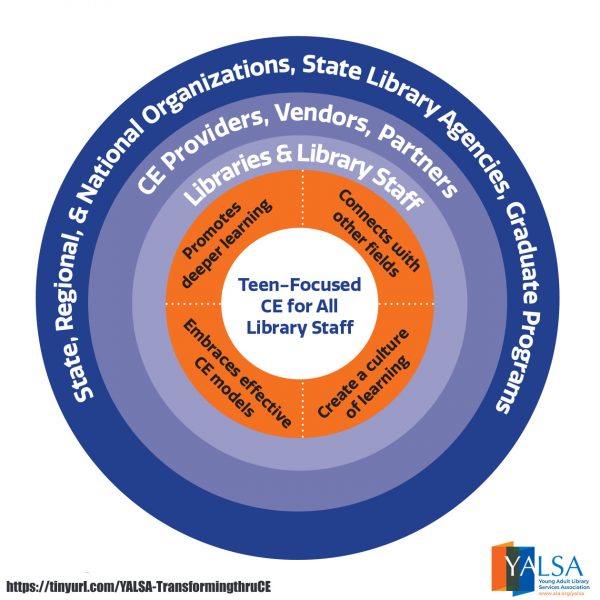2018 School Spending Survey Report
YALSA Releases Recommendations for Continuing Education for Teen Services
The report offers four recommendations and highlights successful models.
 For the Institute of Museum and Library Services grant project, Transforming Library Services for and with Teens Through Continuing Education, the Young Adult Library Services Association (YALSA) and the Chief Officers of State Library Agencies spent a year researching successful continuing education models and learning what more is needed to best equip library staff to meet the needs of their teen patrons. The two organizations held a national forum and town halls, interviewed library administrators and staff, and spoke with various stakeholders during the process. They have now released a report, "Transforming Library Services for and with Teens Through Continuing Education: Findings and Recommendations," based on their findings. The report offers four overall recommendations to improve continuing education for teens:
For the Institute of Museum and Library Services grant project, Transforming Library Services for and with Teens Through Continuing Education, the Young Adult Library Services Association (YALSA) and the Chief Officers of State Library Agencies spent a year researching successful continuing education models and learning what more is needed to best equip library staff to meet the needs of their teen patrons. The two organizations held a national forum and town halls, interviewed library administrators and staff, and spoke with various stakeholders during the process. They have now released a report, "Transforming Library Services for and with Teens Through Continuing Education: Findings and Recommendations," based on their findings. The report offers four overall recommendations to improve continuing education for teens: - Commit to continuing education that promotes deeper learning
- Connect with others to provide a richer learning experience
- Create an organizational culture that prioritizes staff learning
- Embrace effective models for continuing education
 The report also provides recommendations for specific stakeholders, including national organizations working with and for libraries, state library agencies, library science graduate programs, and continuing education providers, designers, and trainers. For more information on the project and its findings and recommendations, read the YALSA blog post, executive summary, or full report. Continuing education resources can be found at ala.org/yalsa/continuingeducation.
The report also provides recommendations for specific stakeholders, including national organizations working with and for libraries, state library agencies, library science graduate programs, and continuing education providers, designers, and trainers. For more information on the project and its findings and recommendations, read the YALSA blog post, executive summary, or full report. Continuing education resources can be found at ala.org/yalsa/continuingeducation. RELATED
RECOMMENDED
CAREERS
The job outlook in 2030: Librarians will be in demand
CAREERS
The job outlook in 2030: Librarians will be in demand
ALREADY A SUBSCRIBER? LOG IN
We are currently offering this content for free. Sign up now to activate your personal profile, where you can save articles for future viewing






Add Comment :-
Be the first reader to comment.
Comment Policy:
Comment should not be empty !!!